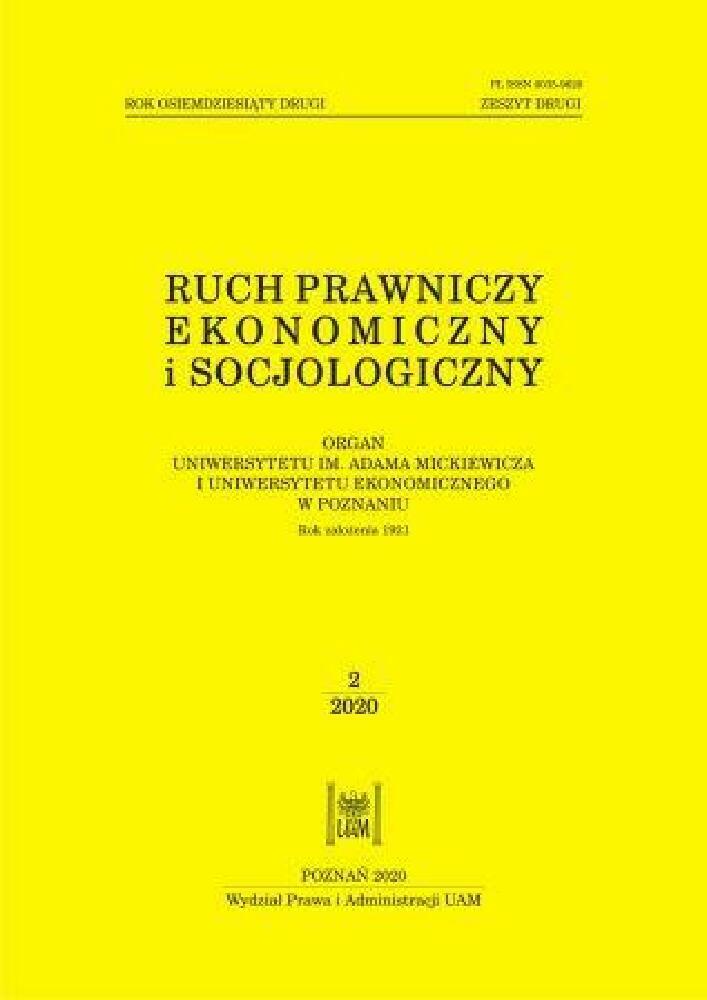Abstrakt
This article contributes to joins the discussion on the copyright framework for educational uses, focusing on the analysis of Article 27 of the Polish Copyright Act, Article 5 of the Directive on copyright and related rights in the Digital Single Market, and Article. 10 of the Berne Convention. Polish copyright law, the Berne Convention and EU Directives are analysed from the historical perspective to answer the question of whether the legal framework for limitations and exceptions for educational uses has changed to respond adequately to the needs of modern education. The concept of ‘illustration for teaching’ is critically analysed, leading to the conclusion that it reflects narrow approach which fails to address pupils/ students’ activities sufficiently. The objective of the article is to emphasize that modern education needs a flexible approach to educational activities with the use of works. It is emphasized, that the objectives of education and copyright are converging, particularly in the area of the conscious use and adequate description of the source of information.
Bibliografia
Barta, J., Markiewicz, R. (2016). Prawo autorskie. Warsaw.
Błeszyński, J. (1985). Prawo Autorskie. Warsaw.
Błońska, B. (2019). Komentarz do art. 27, [in:] W. Machała, R.M. Sarbiński (eds.), Prawo autorskie i prawa pokrewne. Komentarz. [Online]. Warsaw.
Bukowski, M., Marcinkowska, J. (1997). Dozwolony użytek szkolny. Zeszyty Naukowe Uniwersytetu Jagiellońskiego 2: 91–96.
Dreier, T. (2006). Berne Convention for the Protection of Literary and Artistic Works, [in:] T. Dreier, P.B. Hugenholtz (eds.), Concise European Copyright Law. Wolters Kluwer: 7–86.
Dussolier, S. (2013). Limitations and exceptions to copyright and related rights for libraries, research and teaching uses, [in:] J.P. Triaille (ed.), Study on the application of Directive 2001/29/EC on Copyright and Related Rights in the Information Society: 243–400.
European Commission (2016). Assessment of the impact of the European copyright framework on digitally supported education and training practices. Final report. Research team: R. Domčius, R. Xalabarder, P. Junas, D. Pocius, K. Šaduikis, T. Šakűnas. <https://publications.europa.eu/en/publication-detail/-/publication/6d1d28ca-e191-4118-8e65-83130a49f535>.
Gienas, K. (2016). Komentarz do art. 27, [in:] E. Ferenc-Szydełko (ed.), Ustawa o prawie autorskim i prawach pokrewnych. Komentarz. [Online]. Warsaw.
Groeger, G. (1937). Prawo autorskie: ustawa o prawie autorskiem z r. 1926 w brzmieniu jednolitego tekstu z 1935 r. z objaśnieniami i dodaniem Konwencji berneńskiej. Księgarnia Prawnicza.
Grzybowski, S., Serda, J., Kopff, A. (1973). Zagadnienia prawa autorskiego. Warsaw.
Levitas, A., Herczyński, J. (). Decentralizacja w Polsce 1989–2000 – tworzenie systemu. Ośrodek Rozwoju Edukacji. <www.ore.edu.pl>.
Ling, P. (2019). Copyright Infringement Confirmed, but No Damages for “Cordoba” Photographer. <http://ipkitten.blogspot.com/2019/07/copyright-infringement-confirmed-but-no.html>.
Maciak, G. (2012). Możliwości wykorzystania metody projektu do pracy z dziećmi w przedszkolu. Społeczeństwo i Edukacja. Międzynarodowe Studia Humanistyczne 1: 219–237.
Marcinkowska, J. (2004). Dozwolony użytek w prawie autorskim. Cracow.
Masouyé, C. (1978). Guide to the Berne Convention. Geneva 1,
Nobre, T. (2017). Copyright and education in Europe. 15 everyday cases in 15 countries, Final Report. <https://www.communia-association.org/wp-content/uploads/2017/05/15casesin15countries_FinalReport.pdf>.
Osmańska, M. (2014). Wykorzystywanie utworów w dydaktyce w świetle ochrony autorskoprawnej. Dozwolony użytek i otwarte zasoby edukacyjne. Themis Polska Nova 2(7): 190–223.
Pacek, G. (2019). Komentarz do art. 27, [in:] A. Michalak (ed.), Ustawa o prawie autorskim i prawach pokrewnych. Komentarz. [Online]. Warsaw.
Preussner-Zamorska, J., Marcinkowska, J., Laskowska, E. (2017). Dozwolony użytek, [in:] System prawa prywatnego. Prawo autorskie. Warsaw: 565–694.
Ritterman, S. (1937). Komentarz do ustawy o prawie autorskim z przedmową Stefana Sieczkowskiego wiceministra sprawiedliwości. Cracow.
Ricketson, S. (2003). Study on the limitations and exceptions. <https://www.wipo.int/edocs/mdocs/copyright/en/sccr_9/sccr_9_7.pdf>.
Selwyn, N. (2014). The Internet and education. OpenMind. <www.bbvaopenmind.com>.
Seng, D. (2016). Study on copyright limitations and exceptions for educational activities. <https://www.wipo.int/edocs/mdocs/copyright/en/sccr_33/sccr_33_6.pdf>.
Stanisławska-Kloc, S. (2015). Komentarz do art. 27, [in:] D. Flisak (ed.), Prawa autorskie i prawa pokrewne. Komentarz Lex. Warsaw.
Ślęzak, P. (ed.) (2017). Ustawa o prawie autorskim i prawach pokrewnych. Komentarz. Komentarz do art. 27. Legalis. Warsaw.
Torres, M., Xalabarder, R. (2019). Report on practices and challenges in relation to online distance education and research activities, WIPO. <https://www.wipo.int/edocs/mdocs/copyright/en/sccr_39/sccr_39_6.pdf>.
Traple, E. (2011). Komentarz do art. 27, [in:] J. Barta, R. Markiewicz (eds.), Prawo autorskie i prawa pokrewne. Komentarz. Warsaw.
Lewinski, S. von (2010). Rental and lending rights Directive, [in:] M.M. Walter, S. von Lewinski, European Copyright Law: A Commentary. Oxford.
Xalabarder, R. (2009). WIPO Study on Copyright Limitations and Exceptions for Educational Activities in North America, Europe, Caucasus, Central Asia and Israel.
Licencja
Prawa autorskie (c) 2020 WPiA UAM

Utwór dostępny jest na licencji Creative Commons Uznanie autorstwa – Użycie niekomercyjne – Bez utworów zależnych 4.0 Międzynarodowe.





